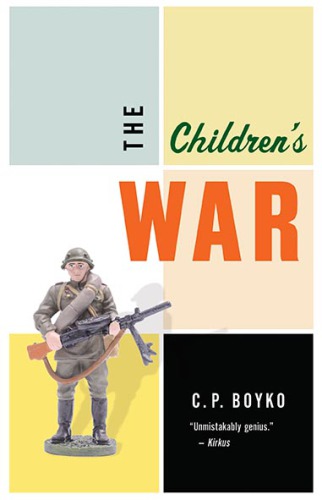
The Children's War
Stories
کتاب های مرتبط
- اطلاعات
- نقد و بررسی
- دیدگاه کاربران
نقد و بررسی

August 1, 2018
In his fourth collection, Boyko (Novelists, 2014, etc.) plumbs for absurdities in war, childhood, parenthood, politics, revolution, and campus demonstrations.Boyko's six-story collection is full of crisp prose, absurdist humor, delightfully atypical craft, and--when aggregated--pessimism: In every story the characters prove incapable of enacting positive change in their lives or societies. In the first (and least impressive) story, a childish high school teacher tries to "tear the [school's] walls down" but instead becomes "every teacher he had ever hated." In the brilliant and moving novella Andrew and Hillary, the title characters move through childhood and into war--Hillary as a doctor; Andrew, who "never grew up," as a reckless ambulance driver and profiteer--where they fail to do what the very structure of the story seems to suggest: fulfill each other. In "Year-End," discontented workers overthrow their factory's management, break into factions, emulate their former tyrannical bosses, and end up worse off than they started. In "Birth Pangs," a woman who has every reason not to have another child--her husband is a manipulative chauvinist; her previous pregnancy was downright brutal (here, as in Andrew and Hillary, Boyko demonstrates his mastery of the lengthy, gory medical scene); and her son is an unhealthy nightmare--has to decide what to do. In "Infantry," two armies composed of women wage a bloody (and evidently pointless) conventional war, and the women behave just as history tells us male soldiers do: They curse, swear, drink and do drugs, visit whorehouses, are cruel to replacements, kill noncombatants, make terrible mistakes, feel fear, feel nostalgia, die beautifully, die horribly, and fight on. In "The Takeover of Founders' Hall," hundreds of students storm a university administration building and begin making wild and disparate demands: "Troy Rosswind wanted smaller classes...Sanders Brand wanted an end to world hunger...Langdon Bellhouse wanted all telemarketers killed." Here, as in the previous stories, the revolutionary event accomplishes real change; but the changes are not the ones that any participant, on any side, desires.Ironic, absurd, pedantic, graphic, tragic, beautiful, surprising, nuanced, polyphonic, exhausting, and unmistakably genius--Boyko's latest has its flaws, but oh boy does it capture the cacophonic slide toward personal and societal incoherence.
COPYRIGHT(2018) Kirkus Reviews, ALL RIGHTS RESERVED.

October 1, 2018
Canadian author Boyko (Novelists) offers a volume of stories for readers who like their collections big and bold. "Andrew and Hillary," for instance, is virtually novella-length, opening with the magic realism-touched childhood friendship of smart, commonsense Hillary and more contentious Andrew, then detailing how each ended up (separately) at a war being fought off the mainland. The story methodically reveals the difficult conduct of combat and is well crafted even as it interestingly defies narrative logic in portraying what finally happens to these characters. "Infantry," also about war (of course), depicts battle fought solely among women combatants, and in their rough-and-readiness they are both like and unlike their male counterparts. Boyko bravely wades into topical issues, though from unexpected angles. "Birth Pangs" shows us parents struggling with a child who's troubled from birth while touching on the frustrations of modern medicine. "Year-End" describes labor strife at a fading factory in dialog format (of equalization of wages, one character says, "Sure. Your salary's as low as mine"). VERDICT Dense but readable, these stories are well developed and sufficiently tilted in content to attract a range of serious readers.
Copyright 2018 Library Journal, LLC Used with permission.

























دیدگاه کاربران